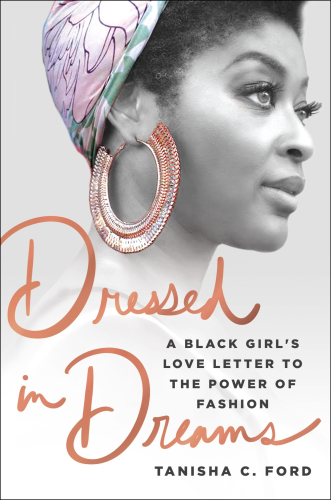
Dressed in Dreams
A Black Girl's Love Letter to the Power of Fashion
کتاب های مرتبط
- اطلاعات
- نقد و بررسی
- دیدگاه کاربران
نقد و بررسی

A professor and pop-culture observer finds insight behind the statement, "clothes are never just garments." For Ford (African Studies and History/Univ. of Delaware; Liberated Threads: Black Women, Style, and the Global Politics of Soul, 2015, etc.) and her generation of black women who came of age in the 1980s and '90s, born to parents who embraced the civil rights and Black Is Beautiful movements, certain garments carried cultural import. In a narrative that progresses by discrete, chronological chapters, the author presents a kind of memoir of her life through certain iconic looks that she incorporated over the years, creating through hairstyle, clothes, and accessories a "powerful social skin." Her topics include the dashiki, baggy jeans, "coochie cutters," knee-high boots ("according to the churchgoing adults in our young lives, knee-high boots were...for club-hopping women, street walkers, strippers, and drug dealers' girlfriends"), bamboo earrings, the afro puff, and the hoodie. Each of these, she asserts, was a black innovation that encapsulated "rich, textured stories of our lives." The dashiki was adopted by black militants in the late 1960s as a symbol of pan-African struggle. In a humorous section, Ford describes the Jheri curl craze of the 1980s, sported by Michael Jackson and others. "Hands down," she writes, "the Jheri curl is the most maligned hairstyle in black history" as well as "the messiest...smelliest hairstyle ever invented." As the author delineates, many of the looks were inspired by urban culture and the emergent genre of hip-hop. As Ford moved from high school to college, where she majored in English literature and African studies, she continued to experiment with her look as a reflection of her inner self. Later, "with three degrees behind my name," she championed the hoodie look as a form of protest and sympathy with the Black Lives Matter movement. An entertaining coming-of-age memoir from "a proud dashiki daughter, dressed in my own dreams."
COPYRIGHT(2019) Kirkus Reviews, ALL RIGHTS RESERVED. (Online Review)

May 27, 2019
Ford, a professor of history and Africana Studies, follows up 2015’s Liberated Threads with this thoughtful memoir in which “clothes are never just garments.” She traces her journey from industrial Fort Wayne, Ind., through boarding school on the East Coast (where she had to balance the baggy jeans she loved and the Mary Janes the preppy kids were wearing) and a year of college in Atlanta (where the lure of knee-high boots eventually surrendered to the desire to move back to Indiana, where her young son was living with her parents), to a protest of the death of Michael Brown (where hoodies, which were utilitarian for the factory workers of Fort Wayne and fashionable for their kids, became political) and a Louis Vuitton store on Fifth Avenue in New York. The dashiki runs through it all, beginning as a symbol of her parents’ individualism in the 1970s and continuing as a shorthand for their dreams for her. Ford sprinkles in the history and politics of the styles she highlights as well as a deep affection for her mother, the first style icon she knew. Her knowledge of fashion and her love for the women who influenced her style makes this appealing for anyone who’s ever loved a piece of clothing. Agent: Tanya McKinnon, McKinnon McIntyre.

August 2, 2019
Ford's newest work (after Liberated Threads: Black Women, Style, and the Global Politics of Soul) is not your typical memoir. While chronicling her life growing up with "Dashiki" parents in a "Dickies town," the author relates her story to the cultural and sociopolitical importance of African American style. According to Ford, one's wardrobe can speak volumes to one's pride in their culture. For instance, wearing a dashiki can signify black militancy or recognition of African customs. It can also be a practical choice of clothing, adaptable to the environment while being chic (e.g., hair styles). This is especially apparent during Ford's formative years in Indiana and, later, attending a boarding school in the northeast. Indeed, Ford's recollections of living in a segregated Midwestern neighborhood comprise the strongest passages, employing her family, friends, and community as examples of transitions in black style. Chapters delving into adulthood, motherhood, and identity continue the balancing act of style and history established at the beginning of the work. VERDICT A winning look at black girl fashion and a solid addition for all collections.--Leah Huey, Dekalb P.L., IL
Copyright 2019 Library Journal, LLC Used with permission.

Starred review from May 1, 2019
A colorful dashiki. A U.S. Navy leather bomber jacket. A Trayvon Martin hoodie. For academic, pop-culture expert, and fashionista Ford, growing up projects-light with Black radical parents in conservative Fort Wayne, Indiana, these clothing items are talismans charting her evolution into an independent Black woman. Fashion and hair choices have always had particular significance for African Americans as protest against being told all your life that your hair is wrong, your culture is primitive, your family is broken, your mind will never be good enough for college, your money will never be good enough for luxury. Ford's memoir explores the connections between Black style and Black struggle; her nostalgia for Nike kicks is tempered with pain over the crack and gang era they represented ( We watched as our parents' freedom dreams morphed into crack vapor") and anger at Nike executives who for damn sure weren't showing up on our doorsteps to give their condolences to so-and-so's mama after her kid was gunned down in their shoes or beaten and robbed for them. Ford's ultimate fashion achievement, successfully bucking racial profiling at a Louis Vuitton store, represents enfranchisement . . . a feeling few black folk in this country get to feel. (Reprinted with permission of Booklist, copyright 2019, American Library Association.)

























دیدگاه کاربران